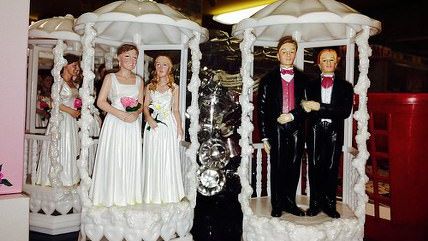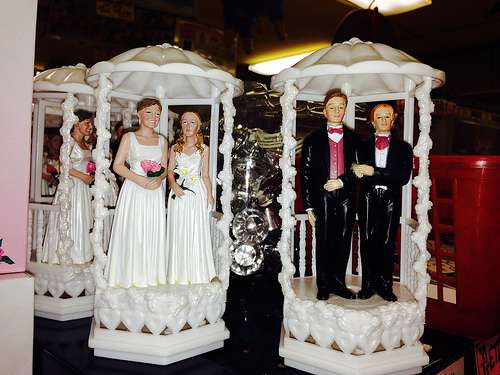Nobody, Gay or Straight, Has the Right to a Wedding Cake
Rather than arguing over who can discriminate or why, look at what goods and services actually need government protection through public accommodation laws.


Libertarians may have tried to debate non-libertarians about whether bakeries can be forced to make wedding cakes for gay couples or what Arizona was trying to accomplish with SB 1062, the vetoed legislation that would have expanded the ability for businesses and individuals to attempt to claim religion as an exemption from public accommodation laws.
The debate might have gone something like this:
Person: It's wrong to discriminate against gay people.
Libertarian: Businesses have the right to choose whether they'll provide their services to people.
Person: Does a bakery have the right to refuse to make a wedding cake for an interracial couple?
Libertarian: Of course.
Person: [side-eye]
Libertarian: Freedom of association!
Person: Civil Rights Act of 1964!
Libertarian: There are no positive rights. Forcing somebody to provide goods or services to you through government mandate is a type of slavery.
Person: No, slavery is when white people beat you with whips and make you work 20 hours a day and rape you! That's slavery! Don't you know history or are you some sort of racist?
And so it goes. The emotional response to America's racist history (and the racist history itself) makes it a challenge to argue for the libertarian ideal of this manifestation of property rights. To a libertarian living in America in 2014 it seems absurd to think that if the Civil Rights Act of 1964 were to expire that segregation would somehow return like it never left. While there is certainly racism in America today and plenty of it, the collusion between bigoted government leaders and bigoted business leaders no longer exists at a level where this country could ever or would ever (or would want to) return to the days of the segregated lunch counter. And not just because lunch counters are largely irrelevant now.
But while there were a lot of ways slavery and segregation could have ended that would have been more aligned to libertarian values, we only have what actually happened. The concept of property rights in America was fundamentally altered in order to force an end to a widespread effort to prohibit minority races from accessing the same goods and services that whites enjoyed.
When the hardcore logic of the libertarian freedom philosophy collides with the larger emotion-based responses to real world discrimination, arguments sometimes go utterly nowhere. There isn't a debate that can be had when the two sides don't even agree on what words like slavery and freedom even mean. A couple of photographers or bakers refusing to accommodate gay weddings utterly pales in comparison to what has happened historically, so there's an irony when supporters of Arizona's legislation are accused of not knowing history. And nothing highlights the absurdity of the emotions behind the outrage than comparing the small number of discriminatory incidents that take place now to the Jim Crow South.
Attempting to create religion-based carve-outs for public accommodation rules and workplace discrimination laws is a suboptimal choice, because it argues that some people have greater freedom of association than others, if they have the right reasons, according to whatever a government body declares. Why should some folks be able to use some holy book as an excuse not to make somebody a cake rather than just having the free speech/free association right for whatever reason at all?
Maybe instead of arguing who should or shouldn't be exempt from certain public accommodation laws, perhaps we should be looking more closely at what's included in public accommodation laws. That's really where the wiggle room is. Do gay couples have a right to make a photographer shoot their wedding? Maybe we should ask if anybody has a right to make a photographer shoot a wedding? Even though a majority of Americans now support gay marriage recognition, a Rasmussen Poll from last summer found that 85 percent of Americans believe that wedding photographers have the right to decline to shoot a gay wedding.
What we should take from that is that perhaps our public accommodation laws are too broad. There is a place in the American consciousness that allows for respect for property rights and freedom of association even if it leads to behavior many agree is bigoted. Title II of the Civil Rights Act of 1964 (which doesn't include sexual orientation) classifies hotels, restaurants (or any place food is served), gas stations, and entertainment venues as places of public accommodation. That's actually it. Ideas of what is classified as a public accommodation have been expanded further by additional federal legislation (like the Americans with Disabilities Act) and state laws. Arizona's public accommodation laws include banks, medical offices, and health clubs, for example. The state does not include sexual orientation as a protected class in its public accommodation laws, though some cities within the state do. Oregon's definition of public accommodation is much vaguer than the federal government's, encompassing nearly all businesses that serve the public and including sexual orientation among the forbidden categories of discrimination. Oregon is where a bakery ran afoul of these laws by refusing to bake a wedding cake for a gay couple and ended up shutting its doors.
If we were to say that goods and services like wedding cakes or wedding photography are not public accommodations then the reasons for refusal wouldn't matter and there would be no reason to have to develop special carve-outs for who could or could not discriminate. Nobody would have a right to demand a baker make them a wedding cake for any reason. It wouldn't matter if the customers were a gay couple, interracial couple, white supremacists, or the baker's ex-wife who dumped him for some loser.
Perhaps public accommodation reform would be a better strategy for trying to preserve at least some level of freedom of association for business owners. It would not be a perfect solution, unfortunately, because some businesses would still not have their full freedom to choose whether to serve their customers. But the Rasmussen poll shows that Americans do actually support freedom of association in ways that are being lost in a debate that is focusing too much on who can discriminate and why and not analyzing what goods or services (if any) need government intervention to make sure all Americans have reasonable access.


Show Comments (647)